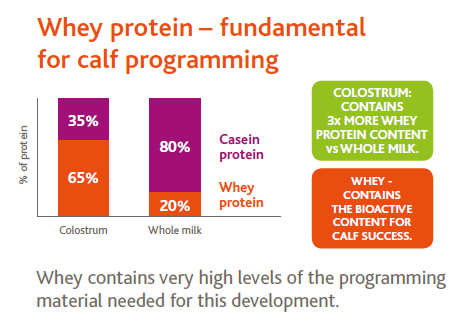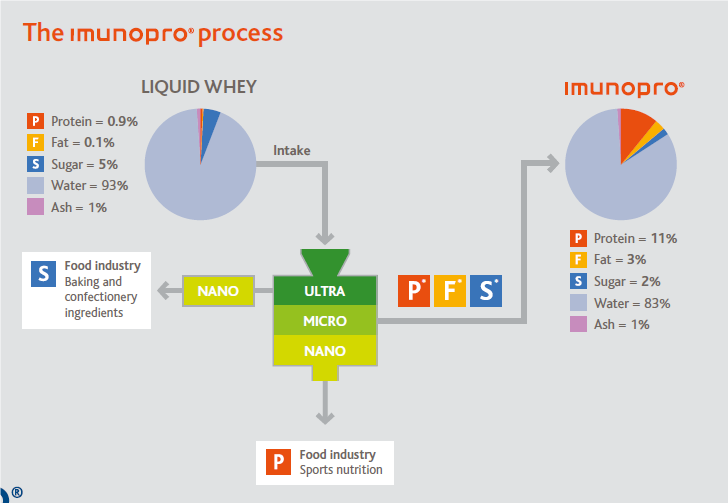It has long been established that colostrum is key for survival and nourishment; but colostrum also has unique ingredients involved in the programming and development of the young animal.
Colostrum consists of a complex mixture of proteins, lipids, simple carbohydrates (primarily lactose), complex carbohydrates (e.g. oligosaccharides), vitamins and minerals.
The proteins which make up colostrum comprise both casein and whey; whey protein represents 65% of the protein content, with only 35% casein (Figure 1).
It is the whey fraction in colostrum that contains the beneficial ingredients (such as immunoglobulins and lactoferrin) that help to support the immune system and influence the growth and development of the calf.
Volac’s whey processing facility in Wales is unique; it produces whey proteins for the food industry (sports nutrition, baking and confectionery ingredients), as well as for young animal feeds (milk replacers) (See Figure 2).
The process enables more of the ‘magic of milk’ to be captured, for use in milk replacers, as a concentrated whey protein and phospholipid base known as ‘Imunopro’.
Imunopro is packed with proteins, fats and sugars containing the vital bio-active components found in the whey fraction of colostrum. These are known to be essential for good calf health, growth and development.
Supplying protein for growth – amino acids
Calves have a requirement for protein; but they also require specific amino acids which are the building blocks of protein.
It is the total quantity and balance of the amino acids, not the crude protein percentage, that is key to driving muscle development and growth. Lysine and leucine are two key amino acids, with leucine influencing the speed of muscle synthesis.
Imunopro has a high level of both lysine and leucine (Table 1). It is estimated that – for the calf – between 14g/day and 17g/day of lysine is needed to drive growth rates of 750g/day and 900g/day respectively.
By using Imunopro as a base for all Volac milk replacers, all products will supply the young calf with enough of the key amino acids to fulfil their daily requirement.
Supplying protein for health – immunoglobulins
Immunoglobulins are proteins that are key for fighting infections; yet the calf is born with virtually none. Colostrum is rich in immunoglobulins and is, therefore, essential for establishing immunity over the first 24 hours.
The ability of the calf to absorb immunoglobulins progressively declines as the gut closes; it completely ceases by about 24 hours after birth.
But immunoglobulins also have a part to play, even after the gut has closed; feeding colostrum and/or transition milk throughout the first two weeks of life has been associated with reduced diarrhoea.
All the immunoglobulins in colostrum are found in the whey fraction; thus, Volac’s concentrated whey protein base, Imunopro, has a high level of immunoglobulins.
Furthermore, due to Volac’s low temperature processing (which is key to ensuring the immunoglobulins remain intact) to process the liquid whey fraction, Imunopro has a high level of IgG – a vital immunoglobulin for early life immune development (Table 1).
Supplying protein for health – lactoferrin
Lactoferrin is a protein which is naturally found in high levels in colostrum and milk. It is important for the development of the immune system and has anti-bacterial properties in the gut.
Research has shown that the supplementation of calves with lactoferrin during the milk feeding period can reduce calf diarrhoea and improve long-term health; lactoferrin significantly reduced mortality and culling when given to pre-weaned calves with the first diagnosis of diarrhoea (Habing et al., 2017). Lactoferrin has been identified in Imunopro at elevated levels.

Table 1: Amount of key amino acids and immunoglobulins in milk, skim milk powder, whey powder and Imunopro. Table source: amino acids (Evonik) and immunoglobulins (Volac)
Supplying sugars for a healthy gut
Milk contains a rich mixture of complex sugars, called oligosaccharides, many of which are bound to proteins and fats. Research continues to establish the important role these sugars play in steering the development of a healthy population of bacteria in the new-born gut of the young animal.
For example, oligosaccharides are used in human milk formula since they are a special source of energy for ‘good’ bacteria in the gut – allowing these ‘friendly’ bacteria to thrive. These oligosaccharides are enriched in whey.
Imunopro – packed with these vital amino acids and functional proteins, fats and sugars – forms the basis of all Volac milk replacers, complemented by other high-quality ingredients, to result in milk replacers that will give calves the best possible start in life.
More information
Volac’s Feed For Growth Programme provides practical advice, resources and support to help farmers grow better cows. Click here for more information




